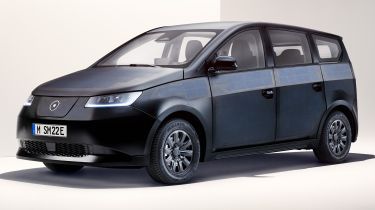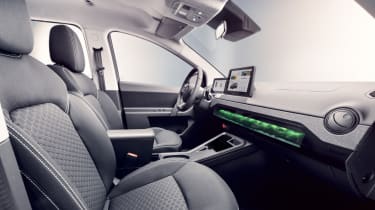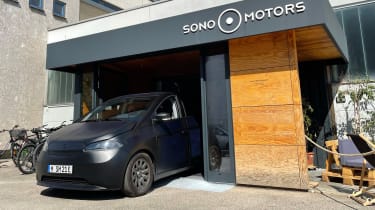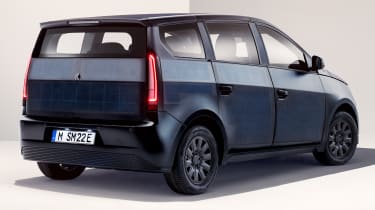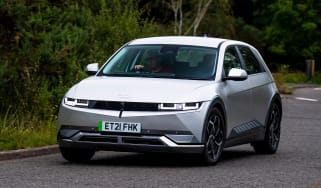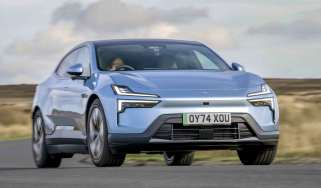Sono Sion solar powered car: prototype review, specs and prices
German startup Sono is using solar power to help charge the firm’s first EV, the Sion. We take a drive and look at its plans to develop the technology
Strapping large and heavy solar panels to the roof of a car has historically been a nice, but flawed idea, based on similar and more workable precedents on domestic and commercial buildings. These harness our world’s most plentiful resource, relieve our electrical infrastructure and reduce CO2 emissions. So, why not cars then? Because most solar-roofed concepts presented over the past 20 years have been too small, too inefficient or both, barely creating enough energy to run their own air-con, let alone power themselves down the road.
But new solar electric vehicle company Sono Motors might be about to change that perception. Starting back in 2012, two entrepreneurial young Germans, Laurin Hahn, who studied electrical engineering, and Jona Christians (computer science and experimental physics) built their first solar car in three years before officially setting up Sono Motors in a Munich garage in 2016.
Since then the pair has sensibly enrolled the help of a few thoughtful eco-minded car-maker veterans, including ex-Daimler strategist and Nissan Europe CEO Thomas Hausch as Sono’s chief operating officer, and also an ex-Volkswagen designer and ex-BMW finance expert, too.
Why should anyone take notice of this startup with big dreams? Firstly, their Sono Sion car has 456 half-cell solar panels on the roof, bonnet, rear hatch and doors. They are covered in thin, flexible protective polymer layers that are two-thirds lighter than glass and can effectively capture the sun’s rays at different angles.
Secondly, the self-developed and patented cells were designed from the outset for transport, not adapted from other industries. The energy generated is conservatively estimated to extend the Sion’s 190-mile range from its 54kWh battery by 70 miles a week on average.
The battery can charge up to 75kW (DC) and 11kW (AC) and is of a lithium iron phosphate type which Sono says, unlike lithium-ion equivalents, requires no cobalt, nickel or manganese, is non-flammable and has a longer lifespan. The battery also has bi-directional charging capability and three top-up ports – located under a front-grille flap – including a CCS connector system and Type 2 connector as standard. Sono claims the Sion can recharge in 35 minutes via CCS. But perhaps the most compelling element of Sono’s story is that the Sion isn’t an elitist, high-price EV. At 4,290mm long, 1,830mm wide and 16,70mm high it has clear mini-MPV proportions and a net £21,000 price (25,126 Euros).
As of 1 July 2022, Sono has a total of 19,000 private reservations, with an average £1,850 (2,225 Euros) down-payment made. The only colour available is black, which has been chosen to make the otherwise-dark solar panels blend in better. On dull days the whole car just looks matt black and on brighter days the solar panels appear blue-grey, revealing the car’s big eco-tech secret.
What about all those solar panels in a crash situation though? “They’re actually more resistant than a normal auto body,” CEO Jona Christians says. “And if real damage occurs we can swap them panel by panel, with no respray required.” Independent service partners will be hired for that job to avoid dealer network costs, and sales are planned to be direct and online.
What is the Sono Sion like to drive?
Driving a late-2021 prototype around the perimeter of Sono’s Munich HQ with a few bright cones put down for direction – this car isn’t road-legal – you still get a good sense of the solar EV’s make-up. It may only have average build quality and panel gaps that need resolution, but that’s typical of an early prototype.
It accelerates in reasonable EV fashion – Sono says 0-62mph takes 9.0 seconds – and it definitely does so with more oomph than a Citroen Ami, if less rapidly and assuredly than a BMW i3. Manoeuvring via what looks like an off-the-shelf steering wheel is okay, but the turning circle is wide. Braking levels were fine at the low speeds tested, but high speeds were not safe to try in Sono HQ’s compact grounds. However, a top speed of 87mph is listed, with 163hp on tap from the electric motor via a single-speed transmission.
The prototype’s interior, while commendably using recycled plastic on the dash, feels a little grey and old-school. It’s a big cabin, though, with room for up to three child seats and a 650-litre boot that rises to 1,200 litres with rear seats folded (plus an extra front boot, too).
Despite the smart 11-inch colour infotainment screen, the stand-out cabin feature is arguably the air-con system, where living moss is used as part of the air filtration. Its bright green but natural cloud-like structure is displayed under a clear panel running across the dash and will feature in the production version, although Sono’s interior designer when we visited (who’s just joined BMW) told us the moss might have to be processed with a few chemicals to stop it going mouldy. Still, it’s a distinctive detail – and could well be a unique feature for a production car.
The 2022 production-ready model was revealed in July and looks to have considerably improved the quality and design of the prototype we drove, despite having the same basic spec. Exterior changes include new front and rear lights plus cleaner surfaces. There is a new steering wheel and a different seat design front and back inside.
Sono had earmarked 2022 to start production at the ex-Saab NEVS facility, but has now shifted this to Finland’s Valmet Automotive in 2023. The firm is also slated to make vehicles for another solar car brand, Lightyear (see page 21), and is already a well established supplier and contract-manufacturer, making the Mercedes A-Class and GLC. If all goes to plan, it aims to produce more than 250,000 Sion cars over seven years.
But Sono won’t be just relying on Sion sales to pay the rent. As important to its business plan is diversification into other transport sectors. It recently launched a ‘Solar Bus Kit’ optimised for the most common 12-metre public transport buses in Europe, including MAN and Mercedes, and offers a complete retrofit solution for fleet operators by adding about eight square metres of solar panels that are able to partially power the large air-con needs of such vehicles.
Sono claims the kit can save 1,500 litres of diesel and up to four tonnes of CO2 per bus, per year. Nineteen companies have already signed up and Sono suggests a return on its investment in three to four years.
The company has also launched an app, which aims to let German owners rent out their Sions – like a cross between Airbnb and Zipcar – to utilise them fully. Customers set the rental prices and gain income from the deal, while Sono takes a 20 per cent fee for each transaction.
All of which makes Sono seem more credible than many EV startups, which often tout expensive, small-run and limited-use EVs. Unfortunately, in spite of recent record-breaking sunshine, there are no plans for a right-hand-drive version of the Sion here in the UK.
In the next few years we’ll just have to watch the firm’s plan unfold from afar, but Sono and other solar-powered transport startups could finally be a useful partial solution to the currently low number of European charging points and the pressure that increasing numbers of regular electric vehicles on the road will add to the power grid.
Succeed or fail, it feels like Sono’s staff have their hearts in the right place, as chief operating officer and auto industry veteran Thomas Hausch concludes: “I’m dumbfounded by the clarity of Sono’s vision, and when I retire I want to be able to justify my career to my kids.”
Harness the power of the sun with these solar-powered chargers...
Find a car with the experts
